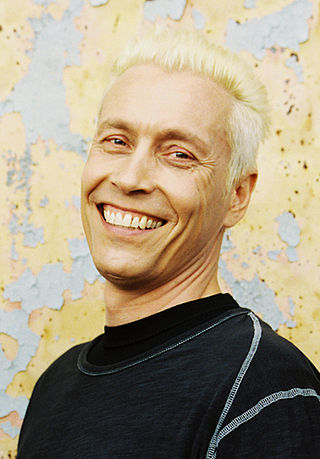Gothic rock is a style of rock music that emerged from post-punk in the United Kingdom in the late 1970s. The first post-punk bands which shifted toward dark music with gothic overtones include Siouxsie and the Banshees, Joy Division, Bauhaus, and the Cure.
Death rock is a rock music subgenre incorporating horror elements and gothic theatrics. It emerged from punk rock on the West Coast of the United States in the early 1980s and overlaps with the gothic rock and horror punk genres. Notable death rock acts include Christian Death, Kommunity FK, 45 Grave, and Super Heroines.
Germany claims some of the most renowned composers, singers, producers and performers of the world. Germany is the largest music market in Europe, and third largest in the world.
Dark wave is a music genre that emerged from the new wave and post-punk movement of the late 1970s. Dark wave compositions are largely based on minor key tonality and introspective lyrics and have been perceived as being dark, romantic and bleak, with an undertone of sorrow. The genre embraces a range of styles including cold wave, ethereal wave, gothic rock, neoclassical dark wave and neofolk.

Horror punk is a music genre that mixes punk rock and 1950s-influenced doo-wop and rockabilly sounds with morbid and violent imagery and lyrics which are often influenced by horror films and science fiction B-movies. The genre was pioneered by the Misfits in the late 1970s and early 1980s. Subsequent bands formed in the Misfits' wake like Mourning Noise, the Undead and Samhain, solidifying horror punk's first wave. In the late 1990s and early 2000s the genre gained attention through the reunion of the Misfits and success of groups like AFI, Son of Sam and the Murderdolls. This popularity continued to the modern day with Blitzkid, Calabrese and Creeper.
A number of heavy metal genres have developed since the emergence of heavy metal during the late 1960s and early 1970s. At times, heavy metal genres may overlap or are difficult to distinguish, but they can be identified by a number of traits. They may differ in terms of instrumentation, tempo, song structure, vocal style, lyrics, guitar playing style, drumming style, and so on.
Lycia is an American dark wave band formed in 1988 in Tempe, Arizona. The main personnel of the band are Mike VanPortfleet, Tara VanFlower and David Galas. Although only achieving minor cult success, the band is notable for being one of the ground breaking groups in darkwave and ethereal wave styles. Their 1995 album The Burning Circle and Then Dust received some attention for the power pop hit song "Pray," and the album "remains a high point of American dark rock," according to AllMusic. Lycia's music is characterized by rich soundscapes and layers of echoed guitars, dark and ethereal keyboards, doomy drum machine beats, VanPortfleet's melancholic, whispered vocals and Vanflower's vivid voice. Trent Reznor and Peter Steele are some of their more well-known fans.
A rivethead or rivet head is a person associated with the industrial dance music scene. In stark contrast to the original industrial culture, whose performers and heterogeneous audience were sometimes referred to as "industrialists", the rivethead scene is a coherent youth culture closely linked to a discernible fashion style. The scene emerged in the late 1980s on the basis of electro-industrial, EBM, and industrial rock music. The associated dress style draws on military fashion and punk aesthetics with hints of fetish wear, mainly inspired by the scene's musical protagonists.
Eerie Von is an American musician best known as the original bassist for the heavy metal band Danzig. His preferred bass is the Fender Jazz Bass.

Jan Vetter, better known as Farin Urlaub, is a German singer, guitarist and songwriter. He is best known as the guitarist/vocalist for punk rock band Die Ärzte. He has also been a solo artist since 2001, touring with his band, the Farin Urlaub Racing Team. His releases starting in 2006 are credited to the band.
Rock music has been performed and heard in Lithuania since the mid-1960s. At first, repression by the Soviet authorities meant that rock was performed only at illegal gatherings, while music from the West was available on Radio Luxembourg or smuggled records. As pressure eased somewhat, rock musicals began to be released, such as Velnio nuotaka and Ugnies medžioklė su varovais.
Pagan rock is a genre of rock music created by adherents of neopagan traditions. It emerged as a distinct genre from gothic rock in the 1980s. Bands in this genre will often use pagan and occult imagery and deal with pagan themes. In some cases the definition is stretched to include rock bands embraced by modern Pagans.
Martial industrial is a syncretic offshoot of industrial music characterized by noise, dark ambient atmospheres, neofolk melodies, dark wave tunes and neoclassical orchestrations as well as the incorporation of audio from military marches, historical speeches and political, apolitical or metapolitical lyrics. Unlike other post-industrial genres, martial industrial is typically interested more in a particular worldview or philosophy than pure experimentalism.

Girls Under Glass (GUG) is a musical group from Hamburg, Germany, founded in 1986 by Thomas Lücke, Hauke Harms, and Volker "Zaphor" Zacharias. Described as "an indispensable part of the German wave and gothic scene", GUG began as a gothic rock band, but quickly crossed genre boundaries, incorporating metal and electronic music of various kinds. They have generally been classified as a darkwave act, but have ranged across the goth–industrial "dark music" spectrum, including into industro-metal, and their work has integrated elements of pop, techno, and trip hop. Grenzwellen-News wrote of the band: "Even after 20 years, it is almost impossible to define and pin-down Girls Under Glass stylistically." A review in 2001 concluded that "even in its most experimental phases, the band has never lost its identity".
Ethereal wave, also called ethereal darkwave, ethereal goth or simply ethereal, is a subgenre of dark wave music that is variously described as "gothic", "romantic", and "otherworldly". Developed in the early 1980s in the UK as an outgrowth of gothic rock, ethereal wave was mainly represented by 4AD bands such as Cocteau Twins, This Mortal Coil, and early guitar-driven Dead Can Dance.
Hyperium Records was a German independent record label specializing in darkwave, neoclassical, ethereal, gothic rock, and ambient music, founded by Oliver Roesch and Oliver van Essenberg in 1991. Roesch died on August 1, 2002 in a motorcycle accident.

Weissglut was a German band from Bingen am Rhein that belonged to the Neue Deutsche Härte direction. It was disbanded in 2002 after the third album, existing further on however under the name Silber.

The Awakening is a South African gothic rock band founded in Johannesburg in 1995 by vocalist, songwriter, multi-instrumentalist, and producer Ashton Nyte. The sound has been described as a hybrid of gothic rock, darkwave, gothic metal, industrial rock, and new wave – a combination that was loosely described by Nyte in 1999 as "dark future rock." The Awakening has released eleven studio albums, several singles, EPs, and two greatest hits compilations in total. As of 2009, The Awakening has been based in the United States.
Futurepop is an electronic music genre that has been characterized as a blend of synthpop, EBM and dance beats, based on trance and techno.
Neue Deutsche Todeskunst is a musical genre that developed in Germany in the late 1980s. It is credited with establishing the German language in the dark wave movement, although there were already such German bands as Xmal Deutschland, Geisterfahrer, and Malaria!.




